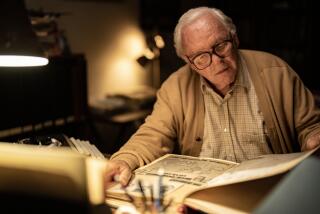John Weidner, Hero in Holocaust, Dies
- Share via
John Henry Weidner, the Dutch-born hero decorated by many nations for rescuing more than 1,000 Jews and Allied airmen from the Nazis during World War II, has died at his home in Monterey Park. He was 81.
Weidner, who moved to the United States in the mid-1950s to escape memories of the war, died Saturday of heart failure, the Southern California Conference of Seventh-day Adventists announced Sunday.
The pacifist son of a Seventh-day Adventist minister, Weidner was a leader of the Dutch-Paris underground, which operated escape routes from war-torn Holland, Belgium and France into neutral Switzerland.
He was captured repeatedly, interrogated by Klaus Barbie, the infamous “Butcher of Lyon,” and tortured by the Gestapo and France’s Milice secret police. He always escaped, jumping off trains, swimming the Rhine under Nazi fire, and once diving out a third-floor prison window just prior to his scheduled execution.
For his efforts, Weidner earned the Order of the British Empire, the Dutch Order of Orange-Nassau and Medal of Resistance, the French Croix de Guerre and the Medaille de la Resistance, Belgium’s Order of King Leopold II and the U.S. Medal of Freedom with Gold Palms. He was also designated an officer of the French Legion of Honor.
Israel, recognizing him as a “Righteous Gentile,” entered his name as a hero in the Golden Book of Jerusalem and planted a tree with his name on the Hill of Remembrance along the Avenue of the Righteous at Yad Vashem. Also recognized by the Simon Wiesenthal Center, Weidner was one of seven people chosen to light candles at last year’s opening of the Holocaust Memorial in Washington, D.C.
Weidner’s wartime exploits were chronicled in the 1966 book by Herbert Ford titled “Flee the Captor.”
Atlantic Union College last year established the John Henry Weidner Center for the Cultivation of the Altruistic Spirit, which will sponsor lectures, concerts, classes, exhibits and social programs promoting altruism.
“During my father’s lifetime,” Weidner said in a speech in Pasadena honoring Holocaust victims in 1989, “he taught me, my family, his parishioners and the community that the most important quality in a human being was to love, respect and treat our fellow man as we wished to be loved, respected and treated.”
“I was a witness to the barbaric treatment of the Jews by the Nazis. I personally observed the crushing of the skull of a Jewish infant who was torn out of the arms of its mother,” he said. “I was determined to heed the teachings and example of my father and I did everything that I could to save as many lives as possible.”
Weidner grew up and was educated in France, where his father taught Greek and Hebrew at a Seventh-day Adventist college near the Swiss border. Still in France when the war broke out, the young businessman worked with the ecumenical Geneva-based World Council of Churches to shepherd Jewish refugees to Switzerland.
He became one of the Gestapo’s most wanted men in Europe with a 5-million-franc price on his head, partially because of the prominence of some he saved. They included Gerni van Heuven Godehart, who later won a Nobel Prize, and Lt. Bram Van der Stok, who became minister of justice for the Dutch government-in-exile.
Weidner aided in prosecuting war criminals after the war.
Moving to Southern California, Weidner married an American and opened a chain of health food stores in the San Gabriel Valley called Weidner Nutrition.
Weidner is survived by his wife, Naomi; a sister, Annette Hipleh, and a nephew. Another sister, Gabrielle, died in the Nazis’ Ravensbrueck concentration camp.
A public memorial service is scheduled at 2 p.m. Saturday at the Seventh-day Adventist Church at 9664 E. Broadway, Temple City.
More to Read
Sign up for Essential California
The most important California stories and recommendations in your inbox every morning.
You may occasionally receive promotional content from the Los Angeles Times.













